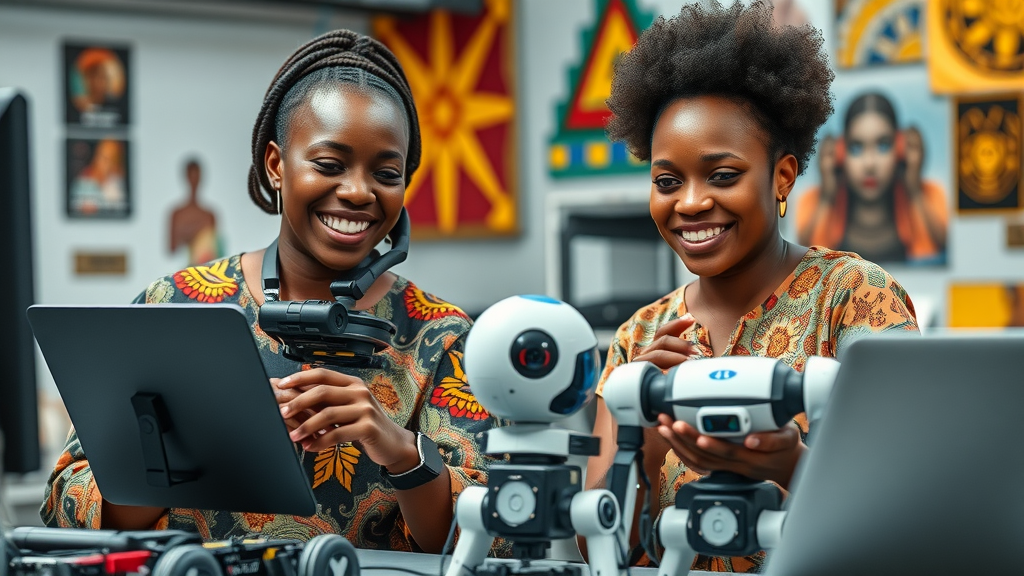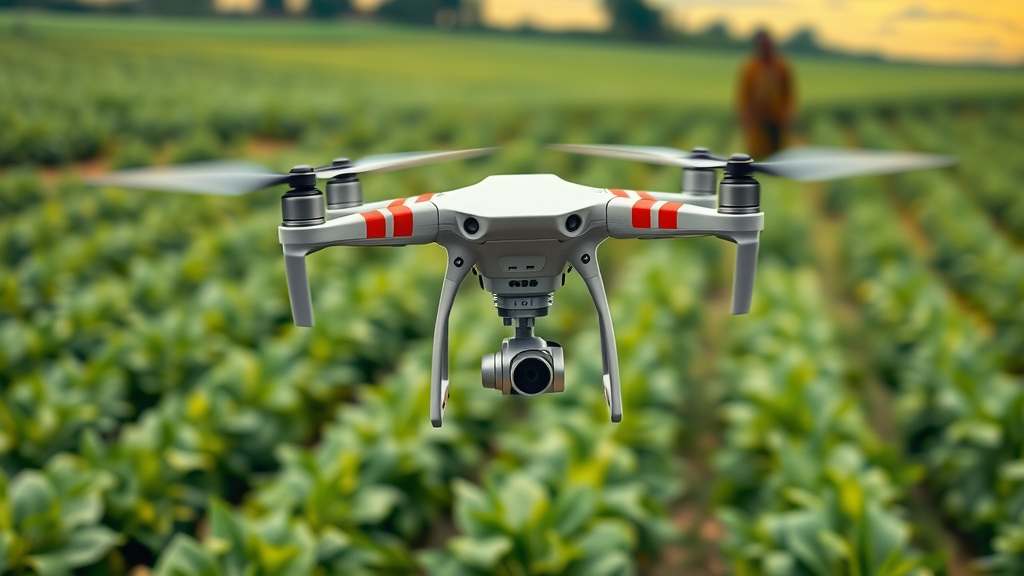Imagine this: by 2030, Africa’s artificial intelligence market is estimated to reach a staggering $6.9 billion . This isn’t just a number—it's a seismic shift that could transform every facet of daily life across the continent. What does this mean for jobs, education, and opportunity? Let’s dive into the real story behind the headlines and see how the AI impact on African economy might change your world.
Revealing the Transformative AI Impact on African Economy
- Did you know that Africa's artificial intelligence market is projected to reach $6.9 billion by 2030? Explore how this unprecedented growth is shaping futures and sparking debates across the African Union and beyond.
The AI impact on African economy is impossible to ignore. Traditionally, Africa has been viewed through the lens of its vast natural resources, but that narrative is evolving rapidly. Increasingly, artificial intelligence (AI) is driving profound change—accelerating innovation, powering new tech hubs, and redefining digital skills among African youth and professionals.
Across both public and private sectors, AI solutions are being leveraged to tackle uniquely African challenges, from streamlining agricultural production to modernizing public services and sparking new industries like fintech and e-health. Governments and the African Union are taking note, launching continent-wide initiatives to harness the potential of AI and position Africa as a player on the global AI stage. Yet, even as the promise grows, so do the debates—about access, ethics, job creation, and who stands to benefit most from this technological leap.

Understanding AI Impact on African Economy: Key Trends and Realities
- AI impact on African economy is reshaping traditional industries, fueling digital skills development, and paving the way for advanced ai solutions across borders. Examine the real-world impact, challenges, and ethical concerns.
Africa’s journey with artificial intelligence is a tale of both urban innovation and widespread transformation. Leading cities like Lagos, Nairobi, and Cape Town are fast becoming epicenters for AI development and data science-driven entrepreneurship. In local agribusiness, AI solutions help farmers maximize yields using real-time data from drones and sensors, while mobile-based fintech platforms serve both city dwellers and rural entrepreneurs, unlocking new avenues for financial inclusion.
However, the AI adoption landscape is not without its hurdles. There are persistent gaps in digital infrastructure, and the development of AI often outpaces regulatory frameworks. These issues raise important questions about data protection, ethical AI models, and equitable access. The effectiveness of emerging AI applications depends largely on how African governments and the private sector navigate these realities, develop robust AI strategies , and cultivate the digital skills necessary for inclusive growth. The stakes are high, as the benefits of AI can be transformative, but only if harnessed thoughtfully and responsibly.
What This Article Delivers
- An overview of the AI impact on African economy
- Analysis of artificial intelligence trends in African markets
- Insights on digital skills, AI development, and the role of the African Union
- Actionable takeaways for individuals and policymakers
If you’re curious about the future of work in Africa, the spread of ai solutions , or how the african union is shaping its strategy, this article is designed for you. Each section blends analysis, policy insight, and tangible examples that spotlight both challenges and breakthroughs. Whether you’re a student, business leader, or policymaker, you’ll find fresh perspectives on digital skills , local innovation, and the full potential of artificial intelligence in the African context.

The African Union’s Strategic Vision for Artificial Intelligence
Harnessing the Potential of AI in Pan-African Policy
- Exploring how the African Union is framing digital skills initiatives, championing AI development, and promoting inclusive ai solutions.
The African Union (AU) recognizes that sustainable economic growth hinges on future-ready policies. Through the Continental Education Strategy for Africa and other flagship initiatives, it is championing the upskilling of youth and professionals in data science, machine learning, and AI tools . Acknowledging the full potential of continental AI strategy , the AU urges member states to integrate digital skills into school curricula and promote innovation through regional AI hubs.
These efforts aim to prepare the African workforce for the future of work , ensuring that the benefits of AI technologies are shared widely—not just by the tech elite. By prioritizing AI solutions tailored for African languages and local challenges, the AU fosters inclusive growth. There is a strong emphasis on public services —using AI models to enhance everything from healthcare diagnosis to government resource allocation—demonstrating a commitment to digital transformation at every level.
Policy and Collaboration: Building the African AI Future
- Assessing collaborative approaches and joint ventures for full potential of artificial intelligence within the continent.
Collaboration is key to unlocking the full potential of AI in Africa. The african union is forging partnerships with global organizations, universities, and the private sector to accelerate the development of AI . These coalitions are helping shape continental ai regulation , data protection standards, and ethical frameworks, which are critical as AI solutions proliferate.
Joint ventures are especially important for resource sharing—pooling data, AI models, and talent across borders to power pan-African solutions. Key initiatives are also underway to support women and underserved communities in tech, ensuring that the digital skills revolution does not leave anyone behind. These strategic partnerships are proving that Africa can leapfrog traditional development models by embracing innovation, provided the policy groundwork remains strong.

Artificial Intelligence as a Catalyst for Economic Growth
Driving Innovation with AI Solutions
- Showcasing AI solutions spearheading fintech, agri-tech, and e-health revolutions; Impact on informal economies and startups.
The AI impact on African economy is perhaps most evident in its startup culture and tech innovation. Across the continent, AI solutions are now central to businesses in fintech, agriculture, and health. For example, fintech startups in South Africa and Nigeria are using AI models to detect fraud, automate loans, and expand banking access to previously underserved communities. In agri-tech, smart sensors and AI-powered drones help farmers boost productivity, anticipate weather changes, and reduce costs.
Even the informal sector—Africa’s economic backbone—benefits through the use of affordable AI tools that streamline trading, logistics, and market analysis. The ripple effect is felt by everyday entrepreneurs, who leverage AI solutions to enter new markets or offer cutting-edge products. As access to AI applications spreads, so does economic opportunity, showing that Africa’s homegrown innovation can shape the continent’s destiny in a global economy.

Enhancing Digital Skills for a Competitive Workforce
- Evaluating digital skills programs and partnerships fostering AI skills across African schools and businesses.
“Artificial intelligence empowers African youth to innovate and drive local economies toward global competitiveness.” – African Union Commission on Science and Technology
At the heart of Africa’s AI wave is the quest for new digital skills . Educational institutions, from universities to vocational centers, are launching AI development programs and partnering with the private sector to train students, educators, and small business owners in coding, machine learning, and data science. These skills are now essential for participating in sectors from healthcare to logistics, ensuring that the workforce is equipped for a future shaped by automation and AI tools.
This digital skills race is about more than creating tech jobs; it’s about economic development and resilience in the face of automation. Regional competitions, hackathons, and collaborative learning are giving young Africans a platform to showcase AI solutions that address uniquely African realities—such as language translation tools for diverse African languages and health apps tuned to local needs. The results are jobs, startups, and entire industries ready to compete—and win—on the global stage.
| Country | AI Adoption Rate | Projected GDP Growth (AI-Driven) | Most Impacted Sectors |
|---|---|---|---|
| South Africa | High | +7.5% by 2030 | Fintech, Healthcare, Retail |
| Nigeria | Growing | +8.2% by 2030 | Agriculture, e-Commerce, Logistics |
| Egypt | Moderate | +5.8% by 2030 | Tourism, Manufacturing, Education |
| Kenya | Expanding | +6.1% by 2030 | Agri-tech, Mobile Banking, Health |

Overcoming Barriers: Challenges in AI Development across Africa
Digital Infrastructure and Education Gaps
- Identifying digital skills mismatches, connectivity issues, and regional disparities in AI adoption.
It’s clear that Africa cannot unleash the full potential of AI without robust digital infrastructure. Many regions still grapple with unreliable internet, limited electricity, and an uneven distribution of technology. These gaps make AI adoption more challenging and risk exacerbating inequalities between urban and rural populations. The shortage of skilled teachers and training in advanced digital skills also slows both educational and economic progress.
To bridge these divides, African governments and the African Union are investing in infrastructure—expanding broadband, supporting solar-powered classrooms, and building community-based tech centers. Grassroots efforts are emerging too, such as teachers in rural communities using solar-powered tablets for AI lessons, proving that innovative approaches can reach even the hardest-to-serve schools.

Bias, Ethics, and AI Governance
- Discussing ethical implications, potential bias in AI data and decision-making, and policies for responsible AI solution use.
“To reach the full potential of AI in Africa, investments must prioritize equitable access and robust regulatory frameworks.” – Leading African AI Researcher
AI is not just a tool, but a system shaped by the data and decisions of those who build it. Concerns about AI ethics, bias in data, and privacy loom large. African countries face the challenge of ensuring that AI models reflect local realities rather than being imported wholesale from the United States or Europe. Inclusive, locally relevant datasets are crucial to prevent digital discrimination and to make AI solutions work for Africa’s diverse societies.
Progress requires AI regulation that balances innovation with responsibility: policies that protect data without stifling growth, frameworks that prioritize privacy, and clear guidelines for ethical designs. The African Union and leading stakeholders are developing pan-African codes of conduct and standards to make sure AI is used safely and fairly across borders and industries.

Unlocking the Full Potential: Future-Proofing the African Workforce
AI Development and Digital Inclusion
- Strategic recommendations for upskilling, promoting inclusion, and supporting women and underserved groups in AI fields.

To future-proof its workforce, Africa must look beyond access and focus on inclusive AI development . This means providing digital skills training for everyone—especially women, youth, and historically marginalized groups. Strategic investment in scholarships, mentorships, and incubator programs for women and girls in tech is already yielding innovative AI applications that address local needs.
Greater inclusion will not just help fill the digital skills gap but will bring new perspectives to problem-solving and design. Global partners and African organizations alike must keep supporting inclusive AI training, ensuring that the continent’s AI revolution is as broad-based and resilient as possible.
Fostering Local AI Solutions and Homegrown Innovation
- Spotlight on African innovators leveraging artificial intelligence to address unique regional challenges.
There’s a rising tide of African entrepreneurs, scientists, and coders creating solutions for Africa, by Africa. From drought prediction models in Kenya to new AI-powered language translation platforms, local innovation is everywhere—and it’s often more effective than importing tools built for other contexts. These homegrown efforts underscore the value of context-aware AI models and demonstrate how AI can bridge gaps in public health, agriculture, transportation, and more.
If given the right environment, African innovators can generate truly transformative technologies that drive economic growth , address job creation, and position the continent as a global leader in socially responsible AI.
People Also Ask: How will AI affect the economy in Africa?
- AI impact on African economy will increase productivity, transform sectors like agriculture and healthcare, and create new digital jobs, while also presenting challenges related to job displacement and technology access.
AI is expected to transform the African economy by dramatically improving productivity and efficiency across various sectors. In agriculture, AI tools such as drones and crop management platforms help boost yields, while in healthcare, machine learning models offer early diagnosis and optimize resource allocation in remote clinics. These innovations are creating new digital job opportunities, even as they disrupt traditional roles and demand higher levels of digital skills.
Nevertheless, the rapid growth of AI brings challenges, including the risk of technology-driven job displacement and the need to ensure that opportunities are accessible to all African countries, including less-developed regions with limited digital infrastructure . Success depends on thoughtful policy interventions and ongoing investments in digital education and infrastructure.

People Also Ask: How will Gen AI affect Africa?
- Generative AI can empower local entrepreneurs, automate routine tasks, and enable personalized learning, but also requires robust guidelines to ensure data privacy and ethical AI use across diverse African societies.
Generative AI—AI that can produce text, images, code, and more—is opening up unprecedented opportunities for African entrepreneurs and educators. Small businesses are using AI-powered content creation and chatbots to reach wider audiences, while students benefit from personalized online learning experiences tailored in African languages and contexts.
However, as Gen AI spreads, data protection and privacy become critical. Policymakers and tech leaders must come together to develop standards that safeguard user data, ensure transparency in how AI models operate, and promote fair, unbiased outcomes for users of all backgrounds.
People Also Ask: What impact does AI have on the economy?
- Artificial intelligence has widespread economic impact through process automation, efficiency improvements, fostering new markets, and creating high-value tech jobs for growing populations.
Worldwide, artificial intelligence is redefining what’s possible in business, government, and education. On a structural level, AI automates repetitive tasks, streamlines complex processes, and allows organizations to do more with less. This efficiency leads directly to the creation of new markets—for instance, in AI-powered logistics, digital health consulting, or remote sensing—and generates high-value tech jobs for rapidly growing populations.
The growth in AI also means the birth of a new kind of workforce—one that needs continuous upskilling and adaptability. For Africa, this can drive rapid advances in public services, expand financial inclusion, and foster a new wave of technopreneurs uniquely suited to both local and global markets.

People Also Ask: Why is AI important in Africa?
- AI is important in Africa for bridging infrastructure gaps, improving public services, enhancing financial inclusion, and giving young populations the digital skills necessary for the future.
Africa’s young, fast-growing population stands to gain the most from the revolution in artificial intelligence. AI offers the toolkit to overcome historic infrastructure shortcomings—using smart diagnostics in health, mobile banking for the unbanked, and data-driven public policy to improve everything from energy distribution to traffic flow. The continent is uniquely placed to leapfrog old technologies and jump straight into digital-first, AI-driven solutions.
Importantly, AI provides a pathway for African youth to develop new digital skills, participate in the global economy, and access careers that didn’t exist just a decade ago. This shift has the potential to not only expand economic opportunity but also foster a generation of African tech leaders and innovators.
The Role of Education Institutions in AI Skills Development
- Universities and vocational centers are integrating digital skills and AI development into curricula, leading to sustainable economic growth and innovation.

A rising number of African universities and training centers are embedding AI and digital literacy into every part of the curriculum. By offering certification programs in machine learning, data protection, and robotics, these institutions help create a sustainable pipeline of future talent ready to drive AI development and economic growth.
Through partnerships with tech companies, governments, and the African Union, these centers are not just preparing students for the local job market; they’re equipping them to compete globally. Their work highlights the vital role of education in ensuring that Africa reaps the full benefits of the AI revolution.
Key Takeaways: AI Impact on African Economy
- AI is a double-edged sword—driving both economic opportunity and social challenges.
- Investment in digital skills and infrastructure is crucial for sustainable growth.
- African Union policies and local innovation are central to achieving the full potential of artificial intelligence.
The AI impact on African economy will be defined by our collective choices—how we invest in people, policies, and platforms to shape a future where AI benefits all Africans.
Your Questions Answered on AI Impact on African Economy
- How can small businesses leverage AI solutions? Small businesses can utilize AI tools for customer service (such as chatbots), automate accounting, improve logistics, and personalize marketing outreach. By starting small—think inventory management or digital payments—they gain a competitive edge.
- What are the most promising sectors for AI growth in Africa? Fintech, agriculture (agri-tech), healthcare (e-health), education technology, and logistics are the fastest-expanding sectors for AI adoption.
- How does the African Union plan to regulate artificial intelligence? The African Union is working on continental AI regulation frameworks and ethical codes, with a focus on data protection, privacy, and equitable access for all member states.
- How can digital skills training reduce the negative effects of automation? By equipping workers with digital and AI skills, training ensures workers adapt to automation, transition to new roles, and even create new opportunities in high-tech sectors.
Expert Opinions: The Road Ahead for AI Impact on African Economy
“Africa can leapfrog through the strategic application of artificial intelligence, provided that the right investments and policies are in place.” – AI Policy Advisor
As more african countries prioritize digital transformation, the continent’s future could be shaped by a generation unafraid to innovate, experiment, and lead.
Taking Action: How You Can Shape the AI Impact on African Economy
- Stay informed, support digital skills initiatives, and join conversations led by African innovators, the African Union, and global partners to maximize the positive impact of artificial intelligence on your community.
Ready to take part? Advocate for digital education, support local AI startups, and follow the African Union’s policy developments—because the AI revolution in Africa is one you can help shape, today.
Artificial intelligence (AI) is poised to significantly influence Africa’s economic landscape, with projections estimating the AI market on the continent could reach $7 billion by 2030. ( africanleadershipmagazine.co.uk ) This growth is expected to drive innovation across various sectors, including agriculture, healthcare, and financial services.
In agriculture, AI applications such as precision farming and crop monitoring are anticipated to substantially increase productivity, which is crucial for food security and the livelihoods of millions across the continent. ( kelvglobal.com ) Similarly, the healthcare sector stands to benefit from AI-driven advancements like remote diagnostics and personalized treatment plans, potentially improving health outcomes and life expectancy. ( kelvglobal.com )
However, the integration of AI also presents challenges, notably the risk of job displacement. A recent report highlighted that tasks performed by women in Africa’s outsourcing sector are 10% more susceptible to automation compared to those performed by men, potentially deepening gender inequalities if not addressed. ( apnews.com ) To mitigate such risks, investments in education and skill development are essential. By prioritizing STEM education and implementing reskilling initiatives, Africa can equip its workforce to thrive in an AI-driven economy. ( khusoko.com )
Furthermore, AI has the potential to bridge development gaps by addressing challenges in various sectors. For instance, AI applications are improving medical diagnostics in Zambia, aiding Kenyan farmers in identifying crop diseases, and providing tailored education in Ethiopia. These innovations can help developing nations bypass traditional development phases, similar to the rapid adoption of mobile phones. ( ft.com )
In summary, while AI offers transformative opportunities for Africa’s economy, realizing its full potential requires strategic investments in infrastructure, education, and inclusive policies to ensure equitable benefits across the continent.
 Add Row
Add Row  Add
Add 




Write A Comment